DR. ORMEROD'S OBSERVATIONS ON CONTINUED FEVER.
Da. ORMEROD has been for some years a close observer at St. Bartholo- mew's Hospital, both as student and medical officer ; and he has been in- duced to give particular attention to the subject of fever. From the cases continually occurring itt the hospital be has selected the most striking; arranging them under ffiffereneclasses ; introducing the class by general observations ; and then exhibiting the details of each particular case in its history, symptoms, and treatment, as well as the results of the post mortem examination where death ensued.
"What is fever ?" is, like many other oriaines of medicine, a question more easily asked than answered. "Fever," says Fergusson, "is in a great degree peculiar to the human race, and never, as an idiopathic dis- ease, affects the lower animals. The uncivilized man appears to possess, to a certain extent, an exemption ; for the Negro tribes feel little of ma- larious fever, and the Indian races are far less subject to it than the Eu- ropean." Lcording to the same author, physic is powerless before it: "the battle is to be fought by the nurse, whether in the shape of phy- sician or other attendant it matters not.. . . . Fever will run its coarse, in every climate and every constitution : it cannot be prevented ; and so completely is its dominion established when once begun, that even the worst practitioner—that is to say, the one who interferes the most with violent remedies—cannot always kill his patient. . . . . There can be no treatment of fever by physic , but in studying the juvantia and the lredentia of the case—cultivating the first, eschewing the last." Dr. Ormerod's volume will not throw much new light upon the nature of fever, nor, as it strikes us, do muclitowards establishing any large prin- ciple of knowledge or of treatment. Pure idiopathic fever is not, indeed, the main subject of his work ; but fever complicated with other disorders, or with that worst of all maladies a constitution broken down by poverty, dissipation, or distress, and frequently by lesions of important organs : it also strikes us that sometimes the case quoted is merely one of symptomatic fever, originating in a primary disease, and not itself the primary disorder. Hence a want of general deduction, either in the author or in the facts of his book : the reader is scarcely able to grasp a principle. The book is strictly practical in the sense of being, so far as it goes, a substitute for practice. No description can ever be equal to actual observation; but Dr. Ormerod'a cases are presented so clearly and in such detail, that they form a very good substitute ; and, being all more or less remarkable, (though rarely as examples of idiopathic fever,) they furnish a curious collection of particular examples, from which Dr. Ormerod occasionally de- duces practical rules of treatment, though rarely of extensive application. The only great rule is confirmatory of Fergusson's principle of treatment —to study the juvantia and the leedentia. Watch the case, meet the symptoms as they arise, prescribe what agrees with the patient, eschew what disagrees, and leave the result to Nature ; unless there is evident disease. Perhaps, however, the most important general deduction in the volume (for it can hardly be called a principle) is the care and caution requisite in dealing with complicated fever. Too much care cannot be used in endeavouring to ascertain whether the affection of an organ 111 primary and independent of the fever, or whether it may be induced bye' is connected with the fever : too much caution cannot be used in actively treating such cases, especially in the undermined or shattered consti- tutions that form so large a proportion of hospital patients, or the poor in general- In a literary point of view, the narrative of the cases, as we have al- ready said, is clear, full, and succinct; the matter of the " clinical ob- servations" upon each case judicious; and the expression plain. In the introductory or closing observations on each class of cases, Dr. Ormerod sometimes manifests an ambition of largeness of grasp which the result falls to support. Part of this may be owing to the formality of the col- lege still adhering to the bachelor of medicine : there is too much of the schools in his style, which is somewhat cumbrous and involved. From the nature of the book, it is of course rather professional than popular ; but remarks may be found scattered through its pages that possess a general interest. The following observations on the premoni- tory symptoms which precede fever, and other complaints, is of this kind. It is not only medical men that can "from their own experience recall seve- ral such cases " ; perhaps few except the very robust but must have felt the restlessness, malaise, pain, and what not, that precede a more definite indisposition. It may be a satisfaction to such, if not a comfort, to learn that nothing can be done daring the incubatory process,—unless, indeed, in slight cases the desperate remedy of a debauch ! "Patients are sometimes admitted suffering from what, after much puzzling, is set down as anomalous rheumatic pains. W...utment has little effect upon their ailment, as might be expected on such vague indications; yet they are obviously a Rest, and warmth, and time, are looked to for the accomplishment of the cure; and they do not fail us; for, in due time, fever or one of the exanthemata often makes its appearance, and then the patient with his fever, severe as it erally is, loses all his ailments. Probably there are few who could not from Iir own experience recall several such cases, where an attack of this kind has swept away all sorts of ailments, and preceded an uninterrupted enjoyment of hula; as, on the other hand, it is sometimes its first breaking up. It is a very pirtiei view which always looks on acute disease as a sudden interruption of good health: doubtless it often is so :=the exanthemata themselves supply the beatexample of this occurrence,—bat is it that acute disease always engrafts itself on the cause of these anomalous symptoms, or that in it the acute disease already often exists? The delicacy of the presentiment of coming events possessed by the system at large needs only a little observation to be fully appreciated. There is no denying that an attack of fever may be a very effectual though sometimes severe remedy for many intractable ailments,—as for what there was undoubtedly of rheumatism in the last case—and that it really removes them, and does not complete them, as has been suggested: but the occasional existence of this delicate presentiment of coming disease must not be set aside because hospital patients will not confess to the lassitude, the uneasy nights, the capricious appe- tite, which mark the period of incubation of fever, when it is repeatedly found that tumours, emphysema, valvular disease of the heart, and pleural effusion, have passed unnoticed by them. "Such theoretical notions need not, however, embarrass practice; for it would seem that a disease cannot be treated during its period of incubation, did we even know what the disease was going to be: they should urge us to inquire more closely into the reason why our remedies do not succeed in an individual case, to be more exact in their application, and to feel at times our own uncertainty. It is occasionally necessary to suspend all treatment in order to a clear understand- ing of a case, and to withhold present relief from symptoms in order to their' ultimate cure; but only on this consideration: for the study of disease must be subservient to the consideration that it is human life with which we have to do; and when we cannot see our way clearly, we must carefully feel it, that the patient may live or be at ease, for our knowledge must not be bought by his pain or danger. The rule for our guidance in the treatment of fever is simple: to do all that may be done to control painful or dangerous symptoms, keeping constantly in view that the patient may have to pass through a fortnight or more of a most exhausting d�'sease, with all those specific local complications, the symptoms and treatment of which form so large and important a part of the subject of fever."























 Previous page
Previous page